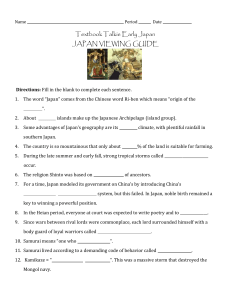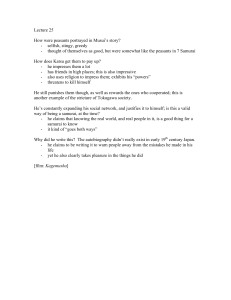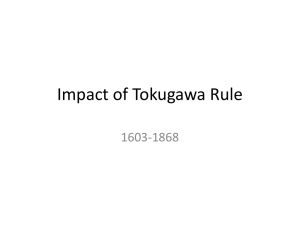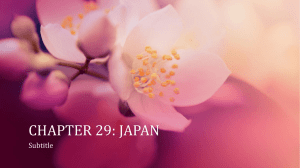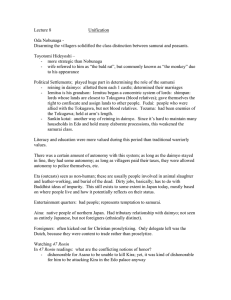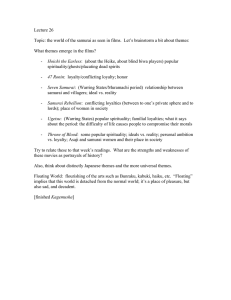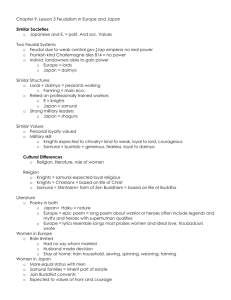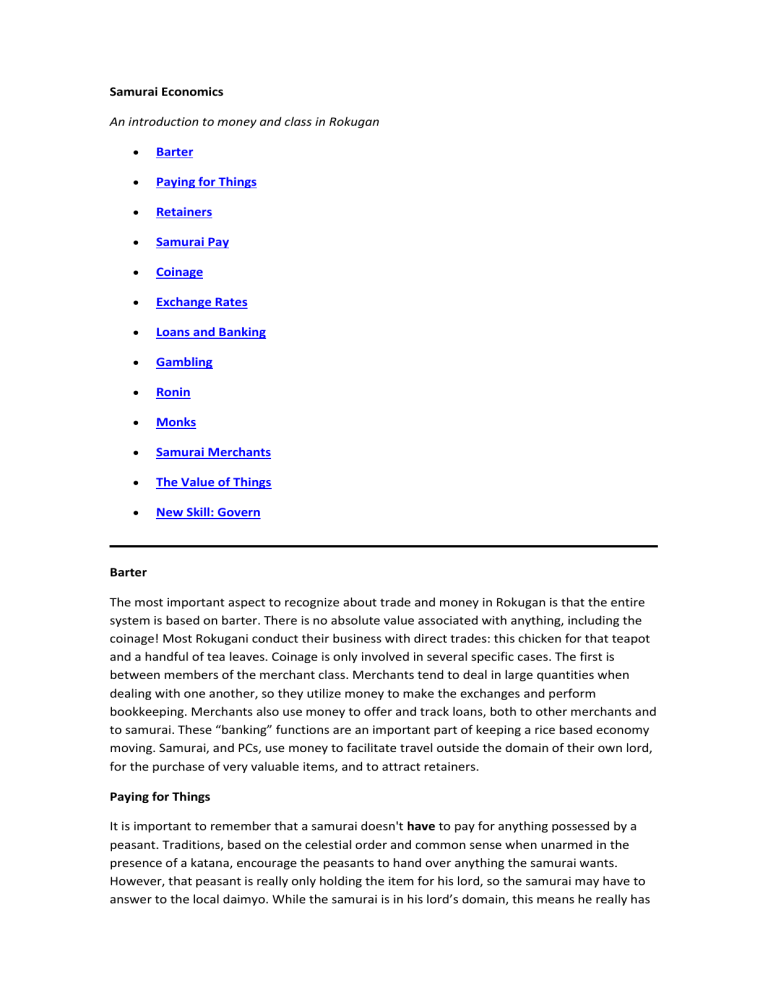
Samurai Economics An introduction to money and class in Rokugan Barter Paying for Things Retainers Samurai Pay Coinage Exchange Rates Loans and Banking Gambling Ronin Monks Samurai Merchants The Value of Things New Skill: Govern Barter The most important aspect to recognize about trade and money in Rokugan is that the entire system is based on barter. There is no absolute value associated with anything, including the coinage! Most Rokugani conduct their business with direct trades: this chicken for that teapot and a handful of tea leaves. Coinage is only involved in several specific cases. The first is between members of the merchant class. Merchants tend to deal in large quantities when dealing with one another, so they utilize money to make the exchanges and perform bookkeeping. Merchants also use money to offer and track loans, both to other merchants and to samurai. These “banking” functions are an important part of keeping a rice based economy moving. Samurai, and PCs, use money to facilitate travel outside the domain of their own lord, for the purchase of very valuable items, and to attract retainers. Paying for Things It is important to remember that a samurai doesn't have to pay for anything possessed by a peasant. Traditions, based on the celestial order and common sense when unarmed in the presence of a katana, encourage the peasants to hand over anything the samurai wants. However, that peasant is really only holding the item for his lord, so the samurai may have to answer to the local daimyo. While the samurai is in his lord’s domain, this means he really has no need for coinage. Everything that he needs will be freely given. His own better judgment prevents him from abusing this privilege. Those that do abuse their lord’s generosity will eventually come to the attention of their betters, and then have to answer to their lord. While traveling the need for money becomes more apparent. Peasants of other areas may suggest a price once goods or service are rendered. The peasantry has a remarkably good eye for spotting samurai not sworn to the local lord. In most instances it is best to simply pay without comment. Haggling with a peasant is beneath a samurai’s dignity, as is asking the price in advance. The vast majority of peasants are honest folk who have no desire to anger anyone with the right to kill them, and ask a fair price. The samurai can of course refuse or even assault the peasant, but such things have consequences. Should the samurai feel that he is being cheated, he may summarily punish the offender. Again, the local authority may take a dim view of such behavior. The local magistrate has considerable power over samurai passing through his district, and has the authority to arbitrarily decide whether the samurai has acted appropriately. Not a person to irritate! The purchase of expensive items is another tricky subject. Items like swords and armor are generally the product of craftsmen who also belong to the samurai class. This means they may desire money for their labors or may be highly offended by it. It is best to simply wait for them to offer terms, then agree without hesitation. Craftsmen sworn to the service of the same lord as the samurai may make a gift of the item to one who displays great fealty. Craftsmen who belong to a different lord will probably have to be paid. Extravagantly so. Unless the samurai is very wealthy, very famous, or very well connected in the courts, he should stick with his own lord’s craftsmen. War-horses also fall into this category. Unless received as a gift or provided by one’s lord, they will prove terribly expensive. Even simple riding horses may be out of the samurai’s reach. Retainers The real value of money to the samurai class is for attracting retainers. Officially, samurai are never paid to serve. That sort of thing is for lordless ronin. A real samurai would never consider mere money to be inducement to serve; he is offering his very life! Instead he humbly receive rewards for his loyalty. This has some strange effects when viewed from western society. For example, when a daimyo wishes to fill a 50 koku position (captain of the Honor Guard or emissary to the Lion Clan perhaps) he does not select a samurai with the appropriate skills and begin paying him 50 koku. Instead he searches amongst his retainers for one who’s previous loyalty and devotion have earned him a 50 koku stipend and puts that samurai in the position. A more skilled samurai who currently receives 10 koku will be passed over for a poorly suited candidate who has proven loyalty or is from a better family (thus already receiving 50 koku). Yes, glory ranks mean a lot more than school ranks! Some recognition of skill can be made however. A highly suitable samurai receiving 35 koku might be given and additional allowance of 15 koku to fit him to the post, until his service there merits a permanent increase. Individual daimyo vary in their willingness to do this. The same principle applies at a smaller scale for individual samurai who desire retainers. There is a certain expectation that a samurai of significant loyalty (and income) will attract followers and troops, thereby increasing his value to his lord. The keeping of retainers adds to the samurai’s prestige, but requires a skill with finances than few samurai possess. The samurai must perform a balancing act between the number and quality of his retainers, counterbalanced against his wealth. A retainer who has served for years deserves greater reward than any three new bushi put together. And like a daimyo, if he cannot afford to properly reward his retainers, he loses face. Further, well equipped and skillful retainers reflect credit on their leader, while scraggly followers are worse than none at all. The upkeep of followers is in fact one of the most common uses of a samurai’s funds. Samurai Pay There are three ways in which a samurai typically receives his pay. Junior samurai and the followers of other low ranking samurai sometimes take their income as actual rice. Samurai who receive less than five koku annually may go to the granaries of their lord and receive a twelfth part of their income each month. The samurai will generally trade part of this rice for coin or other goods and eat the rest. These allotments of rice are distributed on the last days of the month. Mid-ranking samurai receive their income as a stipend of coin. This is made possible by the daimyo’s merchants, who trade the rice harvest on behalf of the lord and provide the coin to pay the vassals. The stipend is generally granted in three uneven payments. Two fifths are paid at the start of the summer, the beginning of the season of war. Another fifth is given at the end of the summer to prepare for the winter court season. The remaining two fifths are given at the beginning of the Setsuban festival (New Year’s Eve), when all debts come due. The final method by which samurai are rewarded with income is the granting of a fief. The samurai receives a parcel of land from his daimyo. What remains after the daimyo’s and imperial taxes becomes the samurai’s income. The effective management of the farms, villages, mines, fishing, crafts, and trade that a fief may include is covered by the Govern skill (see below). A samurai receiving a fief is being granted the most sacred task of administering the Emperor’s lands. It is a mark of high favor from one’s lord. A samurai in charge of a small fief may also receive a stipend. Coinage Three types of coins are commonly used in Rokugan. The most valuable is the ryo, an oval shaped plate of gold about two inches by one inch. This is the basic unit of exchange for expensive items and large transactions. Each ryo is worth about five bu, a smaller silver coin. Bu is actually short for ichi bu no [silver], literally “one bu of silver”. A typical bu is a rectangle about one inch by three-quarters of an inch. Bu are used for the purchase of moderately expensive items such as furniture. Each bu is in turn worth four to five “strings” of zeni. These are small (3/4” diameter) round coins made of copper. They have a round or square hole through the middle and are commonly strung on cords to make cash strings. A standard “string” is 100 coins. Zeni are used for all manner of minor items, like tea and food. Whole strings are used for items like clothing or liquor. For very large transactions either stacks of ryo or a forth coin, the oban, are used. Ryo are stacked in lots of twenty-five or fifty and wrapped in heavy paper. The stack is then stamped by the local magistrate's office and ready for use. The rarely seen oban is a heavy disc of gold. In weight and value they are equivalent to forty ryo. Oban are often specifically cast for a particular transaction, and have pictures or text commemorating the event. They may become far more valuable as historical items than for their weight of gold. The reason that descriptions and exchange rates are given only in general terms is that each Clan mints their own coinage. The symbols stamped on the coins vary from place to place, as does the exact size and quality of the metal. Identifying the source of coinage and its relative value is just another part of the Commerce skill, a skill most samurai disdain. Paper money is not in use in Rokugan, at least by samurai. Merchants sometimes use a system of paper IOUs amongst themselves. Samurai who hear of it consider the idea ridiculous. Exchange Rates You may have noticed that samurai are paid in koku, but the coins are ryo, bu, and zeni. A koku is literally five bushels of rice, or enough to feed one person for a year. Samurai who receive a stipend are receiving ryo for their rice at the current exchange rate. Given an average rice harvest brokered by an average merchant, the samurai receives one ryo for each koku. The GM is free to modify that exchange rate to reflect current conditions. When the rice harvest is poor, the value of rice increases and the samurai’s allotment of rice fetches more coin. When the harvest is good the reverse is true. The skill of the lord’s merchant is also a major factor. An incompetent merchant may end up selling low and buying high, while a crafty Yasuki manages to squeeze every last zeni out of the harvest. Poor samurai who take their pay in rice must barter the excess themselves. The quality of the harvest only affects that small part of their income. Those who receive a stipend (the vast majority) are entirely at the mercy of the kami (and the GM). Those who have been fortunate enough to have been granted a fief will find that the income from their farms is fairly stable in terms of ryo. When the harvest is bad they have less rice, but it is worth more and visa-versa. These forces tends to cancel out, giving a consistent value in ryo. Loans & Banking For one reason or another a samurai may find himself in need of money that he doesn't have. In such an instance he may choose to seek out a merchant for a loan. The terms of loans are fairly consistent: one percent interest per month, all debts payable in full before New Year’s Day. Merchants have found that such simple terms are best when dealing with samurai, so as not to confuse or anger them. Samurai who cannot meet their debts on time will be shunned by both merchants and samurai alike. Such a failing can rapidly blossom into an obligation or dark secret. Generally the samurai’s word is the only collateral required. In fact, some unscrupulous merchants will cheerfully loan more to a samurai than he can repay. Bullying or killing the merchant will only make things worse, permanently staining the samurai’s honor. Merchants also act as money-changers. A samurai may need to convert ryo to strings, or bu to ryo. A traveler with the forethought to change his money to that minted in the lands he will be traveling in will also seek out a merchant. Again the rates on such transactions are consistent: five zeni for every ryo exchanged. This may seem like a laughably small amount (about one-quarter of one percent), but multiplied by the volume some merchants deal in and it amounts to a tidy sum for no effort at all. The Emerald Empire has no equivalent to savings accounts. Those who have money simply hold on to it. Investment is also a very inexact science. Each deal must be negotiated separately. Gambling There is of course one other way that money changes hands: gambling. Gambling is a common pastime in Rokugan, from the lowest heimin to the highest courtier. Games are played with dice, tiles, or cards. The most commonly played dice game is known as “Fortunes and Winds”, and the rules of this game are presented in the Way of the Scorpion. Members of the court and respectable samurai turn up their noses at such “common” pursuits. They prefer to wager on the outcome of hunts or other contests. Those who suffer a string of loses may amass considerable debt. While merchants are content to wait until the new year to be paid, gamblers are far less forgiving. Should the gambler even be allowed to leave the table (which he may not be) all debts are due by sunset the following day. If the samurai cannot secure a respectable loan, he will be faced with a shameful obligation or worse. Those who cannot meet courtly wagers are subject to a great loss of face in addition to being obligated to the winner. The winner may choose to be gracious, preventing the glory loss, but making the loser doubly obligated. Such favors and obligations are as much a part of Rokugani economics as the exchange of money. The simplest advice is true: “If you gamble, be prepared to pay.” Ronin While ronin are part of the samurai class, their relationship to the economics of Rokugan is quite different from other samurai. Because they have no lord to shelter them, they have to pay for things everywhere they go. Because of this, unlike most samurai they have an appreciation for the value of their coin. Ronin may learn and use the Commerce skill without penalty. While it is in poor taste, they can even haggle. Ronin lack the steady income of their Clan counterparts. Some few are wealthy while others must scrape from meal to meal. Many resort to gambling to make ends meet. This lack of fixed income means that merchants are more reluctant to give them loans, and the ronin may find himself paying with his service. Ronin will often seek employment with a merchant if they cannot find it with a traditional lord. Merchants regularly need guards or shugenja advisors and aides, and have the money to support a few samurai. This is not a bad life really. They have the privileges of the samurai class without the obligations that come with fealty. If Clan samurai look down on them, well... They learn to live with it. Some ronin have too much honor or pride to accept paid labor for a mere peasant. Those who cannot find their way into the graces of a daimyo may choose to become shugyosha, “student warriors” who follow the Way of the Sword. This is the beginning of a spiritual quest to achieve enlightenment through bushido. Many ronin claim to follow the Way of the Sword, but for most it is simply a lie to preserve On or face. Shugyosha meet with varying levels of respect from clan samurai and other ronin. Those who truly follow the path may come to gain great glory. The Way is a difficult path, but one of honor, akin to becoming a monk. Monks Monks are also are without a steady source of income, but have other means to get by. Most monks stay within their temples. The temple is often self-sufficient or nearly so, with a small farm or elaborate gardens attached. Temples in accessible locations usually have worshipers who bring offerings that increase the temple’s wealth. Those who travel have little difficulty finding food or shelter. It is a great honor for both peasants and samurai alike to have a monk stay in their home. When a monk has needs that cannot be met through simple hospitality, he may accept (beg for) offerings in exchange for prayers when next he visits a shrine. Such offering can be quite lavish, and are added to the monk’s own belongings. The offering is then bartered for what the monk needs and the rest is turned over to a temple. Samurai Merchants Within each Clan there are often a few individuals chosen to serve the Clan’s interests in matters of finance. These individuals retain their family names and carry the wakizashi, but deal in matters of money like common merchants. Normally they are considered courtiers, but some of the shame of acting as a merchant still lingers (Bad Reputation: Merchant). They may use merchant skills like Commerce without penalty to their honor. Those who excel in this service may come to command great trading empires, but never the full respect of their peers. Both the Ide and the Yasuki have schools that are of benefit to samurai merchants, while members of the Yogo family often perform this role for the Scorpion. The Crane Clan seems to prefer the use of peasant merchants, but honor them more highly than other clans do. Both the Lion and Phoenix Clans look upon the pursuit of money as shameful, and dread being called to serve in this fashion. No one knows the Dragon’s policy on this. The Value of Things The Legend of the Five Rings RPG does not use a “price list” for items because all commerce is through barter and exchanging gifts. What follows is a rough outline of some common “prices” so that GMs and players will have some understanding of the relative value of coin and goods. Remember that all exchanges are extremely situational. Glory rank and Clan affiliation play important roles in every transaction. To illustrate this point let’s look at a simple fan. Most players think of their own shopping experiences and envision a merchant proclaiming that the passing samurai “would be most wise to buy this fine fan for just one string of zeni!” And on some days that’s exactly what happens. The fan is then worth 100 zeni. Another day a humble peasant offers the fan to a samurai, “that she may remain cool in this dreadful summer heat.” Now the fan is worthless. It is something a peasant provided, to be discarded once out of the sun. On a very special day the Lady Shizue has nothing else handy, but wishes to show her favor to a clever ronin who has brought her a new story. She gives him the fan. Now it’s priceless, the gift of the daughter of a Clan Champion. In every instance it is the exact same fan. Another illustration: a crafty Yasuki trader has set up his wares along the Peddler Row. He has laid in a stock of mule’s ears, dried and dyed dark purple. He intends to sell them as “oni ears” to passing samurai. To a foolish looking Crane he offers one for two ryo. “Proof of your valor sir.” To a passing Lion he makes no sound, fearful of later vengeance. A fellow Crab walks by and he cries “a bu each, trophies fit for a Crab!” When a Scorpion appears he simply states, “those aren’t for sale.” Should a samurai of his own lord appear, “you don’t want those. They’re the ears off a mule.” A fixed “price list” can never convey the true sense of commerce in Rokugan. Things that cost zeni: A pot of tea. A bowl of rice and pickles. A plate or bowl. A night in the stable loft. Getting carried across a river. One arrowhead. Things that cost strings: A jug of sake or shochu. A whole fish or special dish. A nice mask or fan. A room at an inn. A palanquin around town. Most peasant weapons. Things that cost bu: A bottle of fine sake. A full gourmet meal with desert. A pet bird or good table. A suite at a good inn. A palanquin from one town to the next. A pack horse. Getting a weapon sharpened. A bundle of arrows. A small piece of art. Things that cost ryo: A multiple course feast for a small group. A sword stand or large inlaid cabinet. An evening at a geisha house. Palanquin and bearers from city to city. A riding horse. Getting a weapon polished. A good knife, bow, or pole arm. Ceremonial armor. A diamond or small jewelry. Things that cost a whole lot: Entertaining a daimyo. Furnishing a manor. Courting a geisha. Traveling with a full entourage. A war-horse. A sword. A suit of heavy armor. A minor nemuranai. Failing your lord... New Skill Govern The govern skill covers the various aspects of running a productive fief. It gives a cursory knowledge of the Emperor’s law, taxes, the correct behavior of peasants, the demands of farming and mining, and rudimentary book-keeping. It is a high skill.
